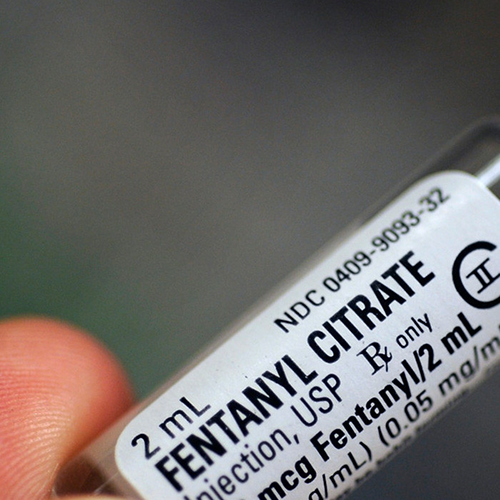

Fentanyl is a synthetic opiate analgesic that is similar to morphine but considerably more powerful. The drug is used to manage moderate to severe pain, particularly chronic or breakthrough pain, in patients who have gained a tolerance to other narcotic pain medications. Fentanyl is available as a transdermal patch, lozenge, film, injection, buccal tablet placed between the gums and cheek, or a sublingual tablet placed under the tongue.
Fentanyl is categorized as a schedule II prescription drug, meaning it has an incredibly high addiction potential. According to the World Health Organization, over 2 million Americans are addicted to prescription opiates like fentanyl. In 2007, the Drug Enforcement Administration found that over 1,000 people in the United States had died that year from fentanyl abuse.
Symptoms of Fentanyl Addiction
Fentanyl works by binding to the opiate receptors found throughout your brain, particularly in areas controlling pain and emotions. When fentanyl binds to these receptors, the brain produces a flood of dopamine, which creates the high. Dopamine has several functions and is involved in motivation, reward, and motor control. Constantly taking fentanyl forces the brain to adjust by reducing the amount of dopamine it produces. After time, a user requires fentanyl to maintain chemical equilibrium while also serving the reward section of their brain. In other words, the user develops an addiction.
- An inability to get out of bed or fall asleep without using fentanyl
- Relying on fentanyl every day even without a prescription
- Becoming disinterested in life when fentanyl isn’t used
- Becoming angry or aggressive
- An inability to get out of bed or fall asleep without using fentanyl
- Relying on fentanyl every day even without a prescription
- Becoming disinterested in life when fentanyl isn’t used
- Becoming angry or aggressive
Withdrawal Symptoms
- Nausea, stomach aches and vomiting
- Agitation / Anxiety
- Insomnia
- Sweating
- Aches and pains in muscles, bones, and joints
- Abdominal cramps
- Diarrhea
- Dilated pupils
Effects of Fentanyl Use
How Fentanyl Affects You
Fentanyl is designed as a pain reliever, flooding your body with dopamine to create a sense of pure euphoria and relaxation. While that high may seem great, it comes with a variety of different side effects, including:
- Drowsiness
- Nausea
- Vomiting
- Diarrhea
- Dry mouth
- General weakness and fatigue
- Severe constipation
- Hives, itching, and skin reactions
- Problems urinating / sleeping
- Back and chest pain
Dangers of Fentanyl Use
Fentanyl comes with a wide range of problems. For one, it is highly addictive, driving a chemical dependency that can ruin your physical health and social life. Addiction is a disease that destroys your self-control, causing you to act out or behave recklessly or uncharacteristically, alienating friends and family in the process.
Another problem with fentanyl is that many people obtain it without a doctor’s prescription. Recent overdoses have been associated with illegally obtained fentanyl, produced in labs that often mix or substitute heroin.
Complications of Fentanyl Use
- Seizures
- Fainting
- Confusion
- Problems swallowing
- Slow or shallow breathing
- Respiratory problems
In some individuals, fentanyl can affect balance, coordination, and thinking, making it a danger to drive or operate machinery.

Medical Intervention for Fentanyl Addiction
Medical Intervention
Due to fentanyl’s potency, medication plays a key role in treating addiction. The right medication can balance out your body’s chemicals and relieve withdrawal symptoms. Combining medication with counseling and therapy is often the best track for treating fentanyl addiction.
Most doctors will prescribe opiate receptor antagonists for fentanyl and other opiate addictions. Opiate receptor antagonists essentially block the effects of opiate drugs. One of the most popular treatments is methadone management treatment. Methadone is an opiate antagonist that:
- Can be taken just once a day
- Prevents you from using more illicit opiate drugs
- Helps against relapse and overdose
- Treats addiction while allowing the patient to continue their day-to-day life
RECOVERING FROM FENTANYL ADDICTION
Recovery
Detox is just the first step. Most detox programs lead directly into long 30-, 60-, or 90-day rehabilitation programs. These programs often use cognitive-behavioral therapy, group therapy, and other forms of treatment to help you stay clean and healthy for the long-term. A comprehensive detox program guided by trained and experienced staff will set you up for success as you enter rehabilitation and get on the path to recovery.

How to Find the Right Fentanyl Detox Facility for You
Georgia Drug Detox can help you find the inpatient detox facility you need. If you have any questions about treatment options or insurance, please don’t hesitate to contact us. To begin your admission process, call now at (678) 771-6411 and start yourself on the road to recovery.

